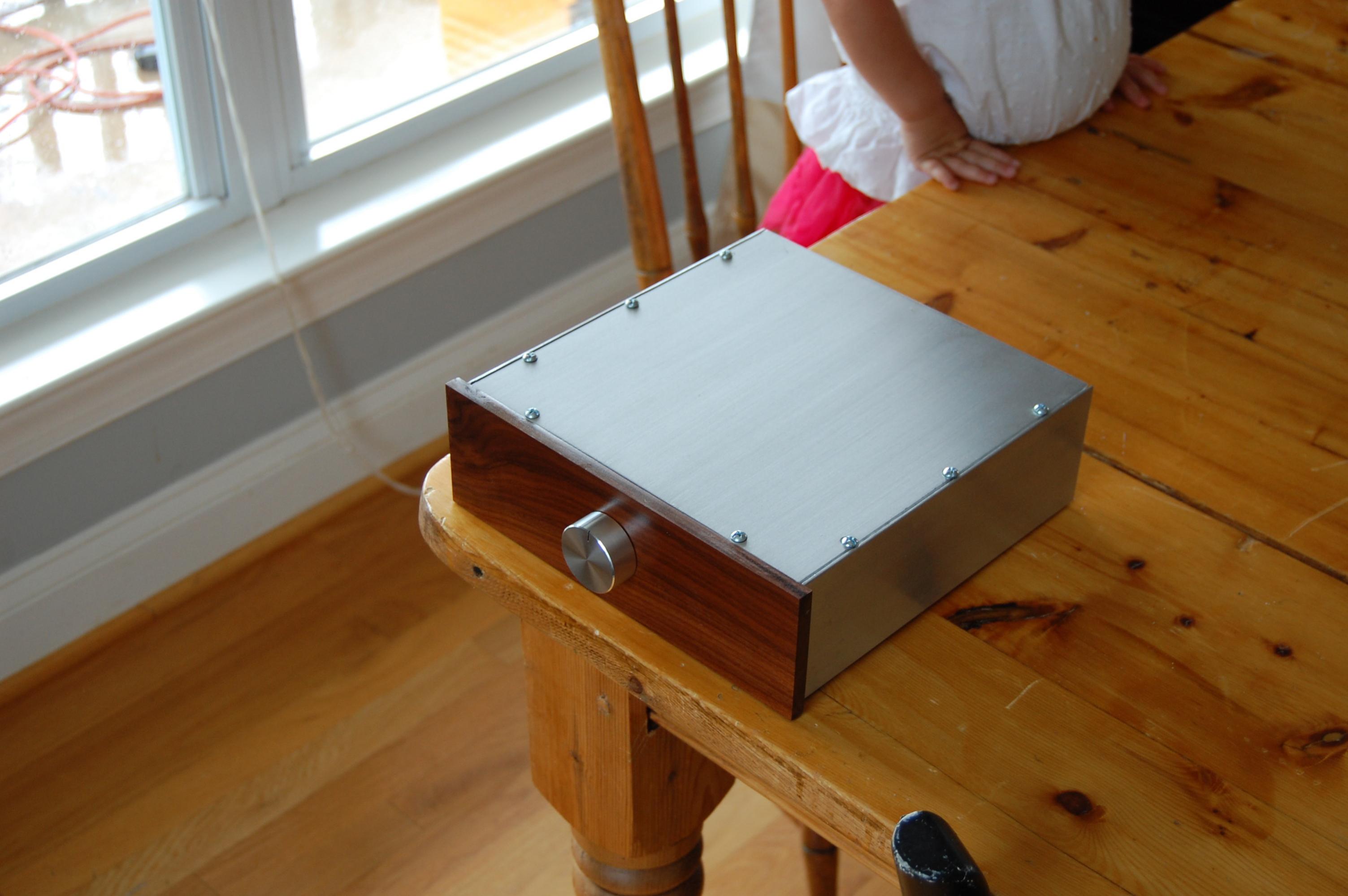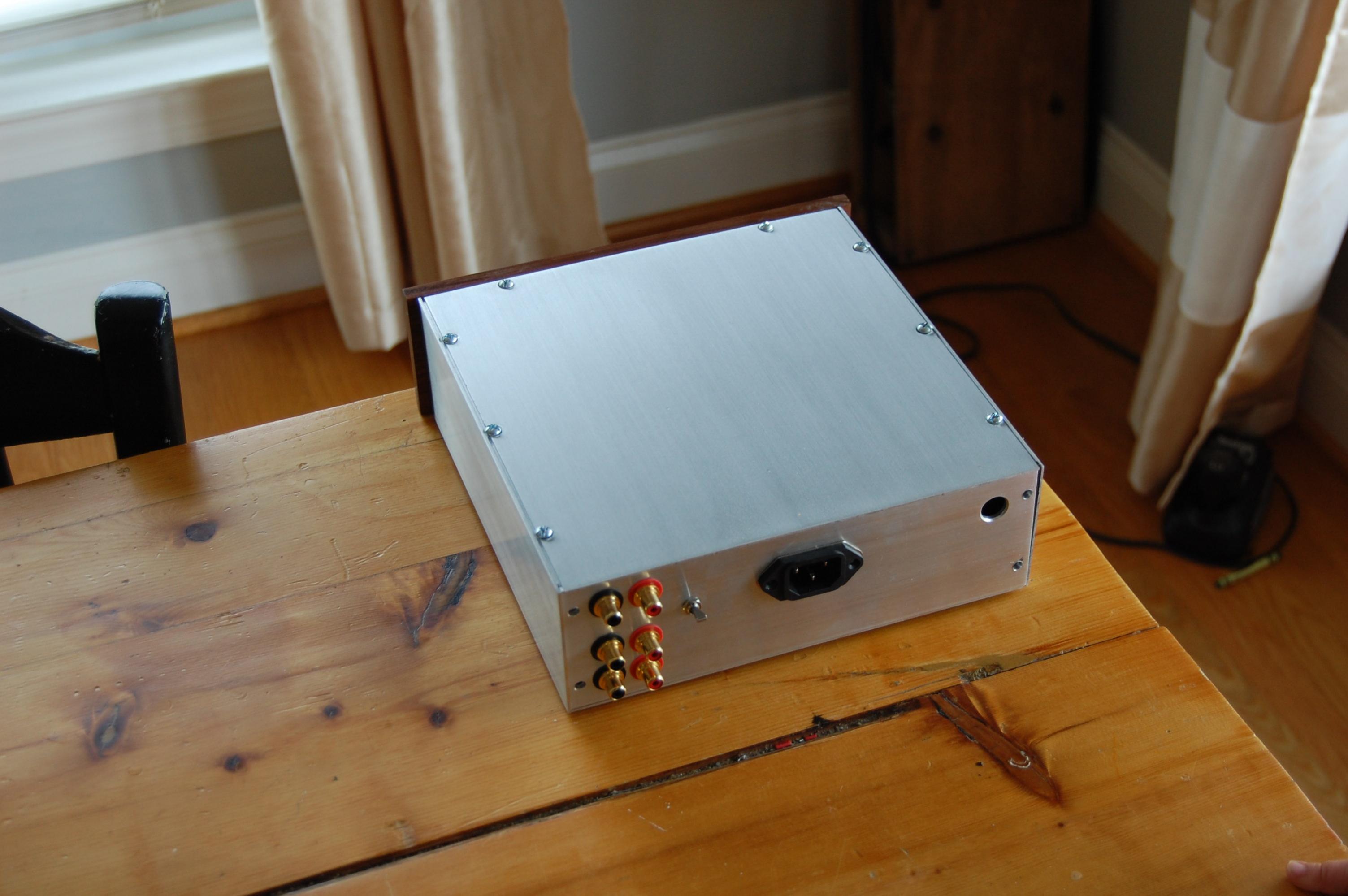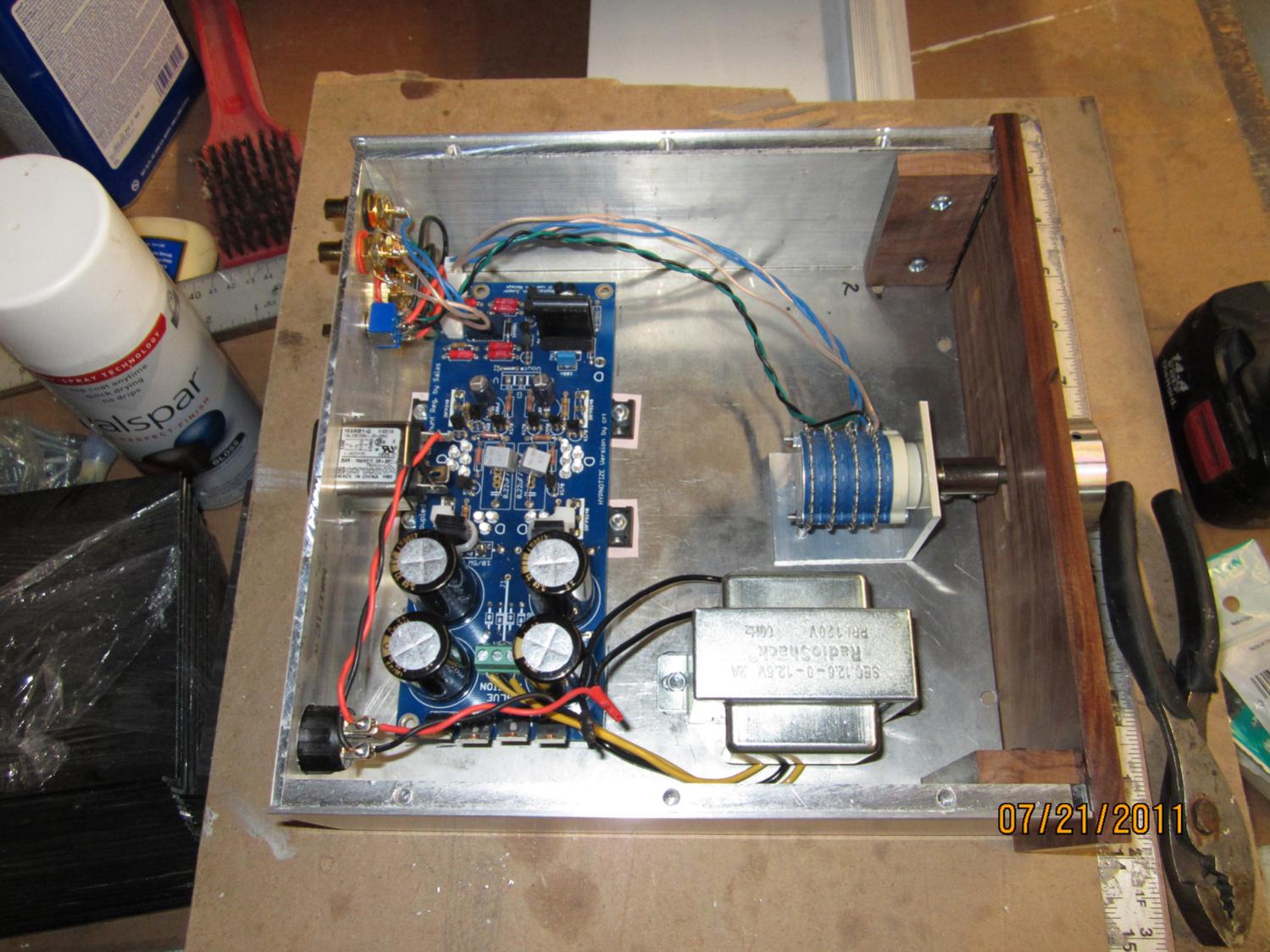Pass DCB1 Buffer

audiocr381ve
Posts: 2,588
I bought one from a guy over at DIYaudio.com. Has anyone built one or heard one? I'd love to hear your thoughts. I liked the Passive Mode on the Adcom GFP-750 so much that I thought this would suit my needs.
Anyway, just trying to get a conversation going about them
Anyway, just trying to get a conversation going about them
Post edited by audiocr381ve on
Comments
-
So you snagged the hod rodded directly coupled, shunt regulated version?Kit or assembled?I have a blank PC board for that version I plan to finish some day.I would expect the simple jfet circuit fed from premium shunt regulated supplies to sound very transparent and neutral.If you liked the 750 in passive mode then I suspect your going to really like this one as it is an excellent choice if you can get away with out needing any gain.
-
So you snagged the hod rodded directly coupled, shunt regulated version?Kit or assembled?I have a blank PC board for that version I plan to finish some day.I would expect the simple jfet circuit fed from premium shunt regulated supplies to sound very transparent and neutral.If you liked the 750 in passive mode then I suspect your going to really like this one as it is an excellent choice if you can get away with out needing any gain.
Yes sir, that's the one. The gentlemen I bought it from assembled it and also put a fair amount of custom work into it AND it also has a very nice stepped attenuator.
I'm very excited to hear it on the new PSB Synchrony One's. I wish I had the GFP-750 to do some comparing, but if I'm thinking about this correctly it should sound the same? I mean, can passive pre's/buffer's have a signature sound? I'm very intrigued.
Here is some eye candy


-
Nudie!
Maybe someone could explain what is actually going on inside the thing for me

-
audiocr381ve wrote: »I mean, can passive pre's/buffer's have a signature sound?
Yes, everything has a different sound. Different parts, different attenuator, different impedance, etc all contributes to the final sound and most importantly SYNERGY. The actual Pass B1 buffer is different than a passive pre-amp. The B1 is active but without voltage gain. I hope it works out for you.
The so-called "passive preamp," an attempt to achieve the ideal line stage without a buffer stage, has in my experience been a sonic failure. Lifeless and comatose are two descriptors that immediately come to mind. Simply inserting a volume control between the source component and power amp ignores two important interface issues. First, there's the issue of impedance matching. Ideally, input impedance should be high and output impedance should be low. That's difficult to achieve without the use of an active buffer or at least a transformer. My sample of the B1 was built by Nelson - as shown in the construction article schematic. The input impedance is a function of the setting of the 25 kOhm potentiometers and ranges up to a maximum of 25 kOhm. Nelson admits that the pots on the B1 are perfectly ordinary, but that they appear to benefit from the very high impedance of the active circuit. And while he has not perceived any sonic issues with them, he points out that you are perfectly free to use your favorite volume control in this application. I would have preferred, for example, a 50 kOhm pot, or even better for my birthday, a motorized remote-controlled attenuator. If you're into stepped attenuators, note that his favorite for a long time has been the Elna with type RN55D resistors. The actual output impedance is dominated by a 1 kOhm resistor (R104 and R204 in the schematic). That's fairly low, but Nelson says that this value can be arbitrarily lowered down to say 200 Ohm, though he cautions that could cause problems with wideband equipment. The second interface issue has to do with the ability of a stage to drive long and/or reactive interconnects. And that's an area that an active buffer stage excels in, though I can't say that I specifically challenged the B1 in this respect, having simply dropped it in to the an existing system which uses fairly short FMS Nexus interconnects.
Despite the Spartan appearance of my B1, it actually offers a capability lacking in much more expensive high-end preamp designs; namely, channel balance control. The dual volume controls allow for independent tweaking of each channel and to my mind this approach represents the preferred method of implementing a balance control. It's surprising that so few modern preamps bother with such a control. In fact, the great J. Gordon Holt once opined that lack of a balance control is nothing short of a fatal design flaw. I find it extremely useful in compensating for inter-channel gain differences and for loudspeaker sensitivity deviations. For example, rarely are loudspeaker drivers matched to better than 1 to 2 dB, and with the B1, a simple tweak of either the left or right pot can re-center the soundstage"Appreciation of audio is a completely subjective human experience. Measurements can provide a measure of insight, but are no substitute for human judgment. Why are we looking to reduce a subjective experience to objective criteria anyway? The subtleties of music and audio reproduction are for those who appreciate it. Differentiation by numbers is for those who do not".--Nelson Pass Pass Labs XA25 | EE Avant Pre | EE Mini Max Supreme DAC | MIT Shotgun S1 | Puritan Audio PSM136 Pwr Condtioner & Classic PC's | Legend L600 | Roon Nucleus 1 w/LPS - Tubes add soul! -
"Appreciation of audio is a completely subjective human experience. Measurements can provide a measure of insight, but are no substitute for human judgment. Why are we looking to reduce a subjective experience to objective criteria anyway? The subtleties of music and audio reproduction are for those who appreciate it. Differentiation by numbers is for those who do not".--Nelson Pass Pass Labs XA25 | EE Avant Pre | EE Mini Max Supreme DAC | MIT Shotgun S1 | Puritan Audio PSM136 Pwr Condtioner & Classic PC's | Legend L600 | Roon Nucleus 1 w/LPS - Tubes add soul!
-
The buffer is still an active circuit, without voltage gain of a typical active pre-amp.
H9"Appreciation of audio is a completely subjective human experience. Measurements can provide a measure of insight, but are no substitute for human judgment. Why are we looking to reduce a subjective experience to objective criteria anyway? The subtleties of music and audio reproduction are for those who appreciate it. Differentiation by numbers is for those who do not".--Nelson Pass Pass Labs XA25 | EE Avant Pre | EE Mini Max Supreme DAC | MIT Shotgun S1 | Puritan Audio PSM136 Pwr Condtioner & Classic PC's | Legend L600 | Roon Nucleus 1 w/LPS - Tubes add soul! -
Thanks for the links, Brock. I feel like I've asked these questions before :redface::redface::redface:
Just a little anxious to hear it :redface: It's coming in tomorrow along with the Squeezebox. Lots of new toys lately, but I'm very close to my perfect sound. -
Yes you have asked them before.

H9"Appreciation of audio is a completely subjective human experience. Measurements can provide a measure of insight, but are no substitute for human judgment. Why are we looking to reduce a subjective experience to objective criteria anyway? The subtleties of music and audio reproduction are for those who appreciate it. Differentiation by numbers is for those who do not".--Nelson Pass Pass Labs XA25 | EE Avant Pre | EE Mini Max Supreme DAC | MIT Shotgun S1 | Puritan Audio PSM136 Pwr Condtioner & Classic PC's | Legend L600 | Roon Nucleus 1 w/LPS - Tubes add soul! -
Nice looking unit.
I see you have already been given the "standard" quote and links but the version you have has some important differences.One being the exclusion of input and outut coupling caps.This was made possible by the use of a sophisticated dual polarity power supply instead of the single positive supply in the original. The stepped attenuator is a nice touch as it will insure close tracking between channels ,since even high quality standard dual ganged pots from the likes of Alps ,Noble etc. can have balance mis matches of a 1 db or more in parts of their rotation. -
Nice looking unit.
I see you have already been given the "standard" quote and links but the version you have has some important differences.One being the exclusion of input and outut coupling caps.This was made possible by the use of a sophisticated dual polarity power supply instead of the single positive supply in the original. The stepped attenuator is a nice touch as it will insure close tracking between channels ,since even high quality standard dual ganged pots from the likes of Alps ,Noble etc. can have balance mis matches of a 1 db or more in parts of their rotation.
I'm very excited about it. I had to wait about 3 weeks for the gentlemen I bought it from to finish it up. I will arrive on Wednesday now. I'll be sure to post impressions
-
Looking forward to your impressions. It looks nice and simple, but it doesn't look like it would be fun to change sources with the placement of the input selector. Mine looks like a bird's nest on the inside.
-
How do you plan on running this? The SQB through this and into the Adcom or on its own into it's own amp?
-
How do you plan on running this? The SQB through this and into the Adcom or on its own into it's own amp?
It will go SBT > Channel Islands DAC > Pass DCB1 > Amp
No more Adcom btw
-
I misread your initial post. I thought you still had it.
I would have kept it. But hopefully this will work out well for you. -
Joe were you by chance the recipient of the PC board for one of these that I karma'd a year or two back?
-
The Pass DCB1 is up and running. I've been listening for two days straight and it's an unbelievably neutral, not even there, piece of gear. I'm finally able to hear what my DAC, the Channel Islands VDA-2, sounds like and it is everything Channel Islands said it would be. My PSB Synchrony One speakers are unreal at communicating timbre and can articulate absolutely any instrument. When a speaker is able to do that, it usually means it sounds like **** with a bad recording. This is not the case with the VDA-2 DAC. It IS analog sounding. NONE of my music is harsh, yet I'm still retaining sparkly highs. Even mp3's sound good. Everything is a joy to listen to and it really is all about synergy I'm learning.
I have learned one important thing as I'm finally arriving at my perfect sound (I confidently say this). It's all about choosing speakers you love and want to work with. I'm now a huge fan of PSB and am overjoyed with their performance in every single regard. They have all the low end I want, the mid-bass is as defined as I've ever heard, the mid range is lush with out being sloppy, the highs are sparkly and non-fatiguing, but it's all about how they all work together. I can't find a single fault, honestly.
Anyway, that should give you my impressions of the DCB1. It contributes nothing of it's own and sends a beautiful signal to the amp. Lovin' it! -
Congrats man, glad you like it. You've just learned, or should I say heard, what impedence matching is all about. Some say it's hogwash, but untill you hear for yourself, you'll never realize how all your pieces should gell together.
In this day and age of some great eye candy of audio gear, complicated systems, boat loads of connected devices, impedence matching isn't first and foremost on most peoples brains. Heck, I'd gather to say many don't even consider it let alone know what it all means. I'd suggest any who take a good interest in their systems to get their read on with this, it really will make your system sound like it's finally all working together.HT SYSTEM-
Sony 850c 4k
Pioneer elite vhx 21
Sony 4k BRP
SVS SB-2000
Polk Sig. 20's
Polk FX500 surrounds
Cables-
Acoustic zen Satori speaker cables
Acoustic zen Matrix 2 IC's
Wireworld eclipse 7 ic's
Audio metallurgy ga-o digital cable
Kitchen
Sonos zp90
Grant Fidelity tube dac
B&k 1420
lsi 9's -
Joe were you by chance the recipient of the PC board for one of these that I karma'd a year or two back?
I was. I will admit I bought tons of stuff for it but haven't gotten around to building the dang thing yet.
I was hoping to this past winter but life had other plans. I do plan on starting it up soon. If it is on my workbench maybe I will get it done.
BTW, thanks again for the Karma.

